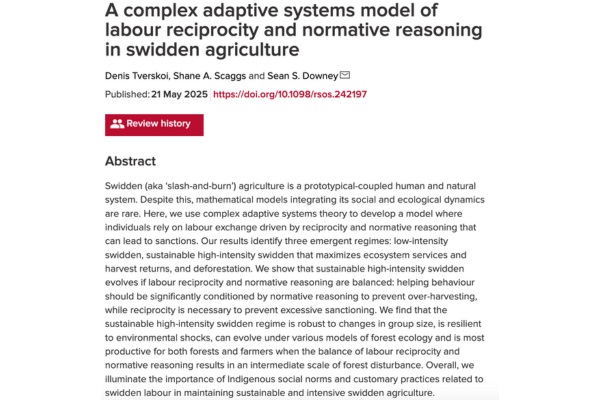New Article in Royal Society Open Science

In their new article, published in Royal Society Open Science, Tverskoi, Scaggs, and Downey present a complex adaptive systems (CAS) model to explore how labour reciprocity and normative reasoning influence the sustainability of swidden (slash-and-burn) agriculture, particularly in Indigenous communities. Drawing from ethnographic and experimental research in Maya villages in Belize, the authors develop a parsimonious agent-based model that simulates how individual decisions about forest clearing, shaped by social norms and reciprocal labour exchange, interact with ecological dynamics. The model identifies three emergent regimes: low-intensity swidden (high sanctions, low cooperation), deforestation (low sanctions, high cooperation), and a sustainable high-intensity swidden regime (balanced sanctions and reciprocity). The sustainable regime is shown to be the most productive for both forests and farmers, emerging when helping behavior is moderately conditioned by normative reasoning to prevent overharvesting, while reciprocity ensures cooperation without excessive sanctioning. The model is robust across varying group sizes, environmental shocks, and ecological conditions, and it highlights the importance of intermediate forest disturbance for optimal biomass regeneration. The findings underscore the critical role of Indigenous social norms in maintaining ecological balance and suggest that sustainable swidden agriculture does not require centralized regulation but can emerge from decentralized, culturally embedded practices. The study contributes to sustainability science by offering a reproducible theoretical framework that integrates social and ecological dimensions of land use, with implications for climate change adaptation and forest conservation policy.
Image: Royal Society Open Science Website
